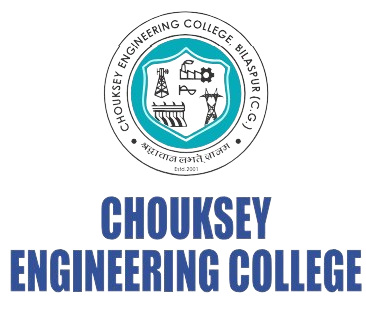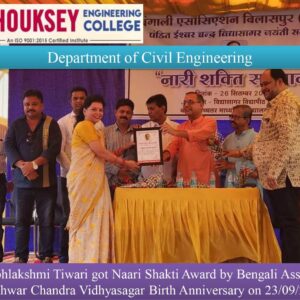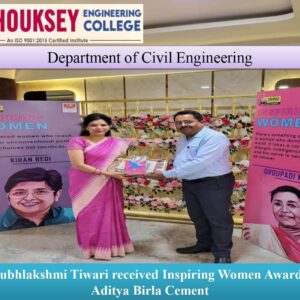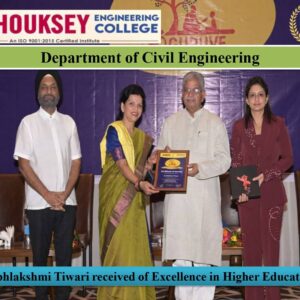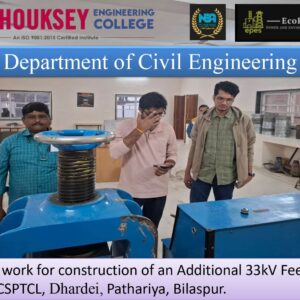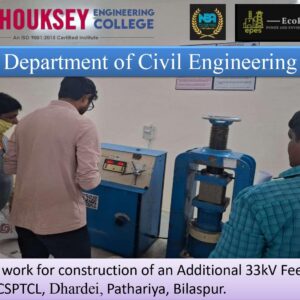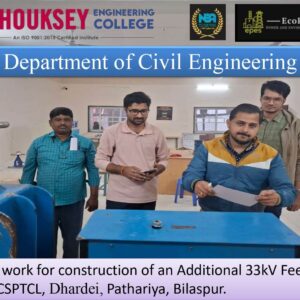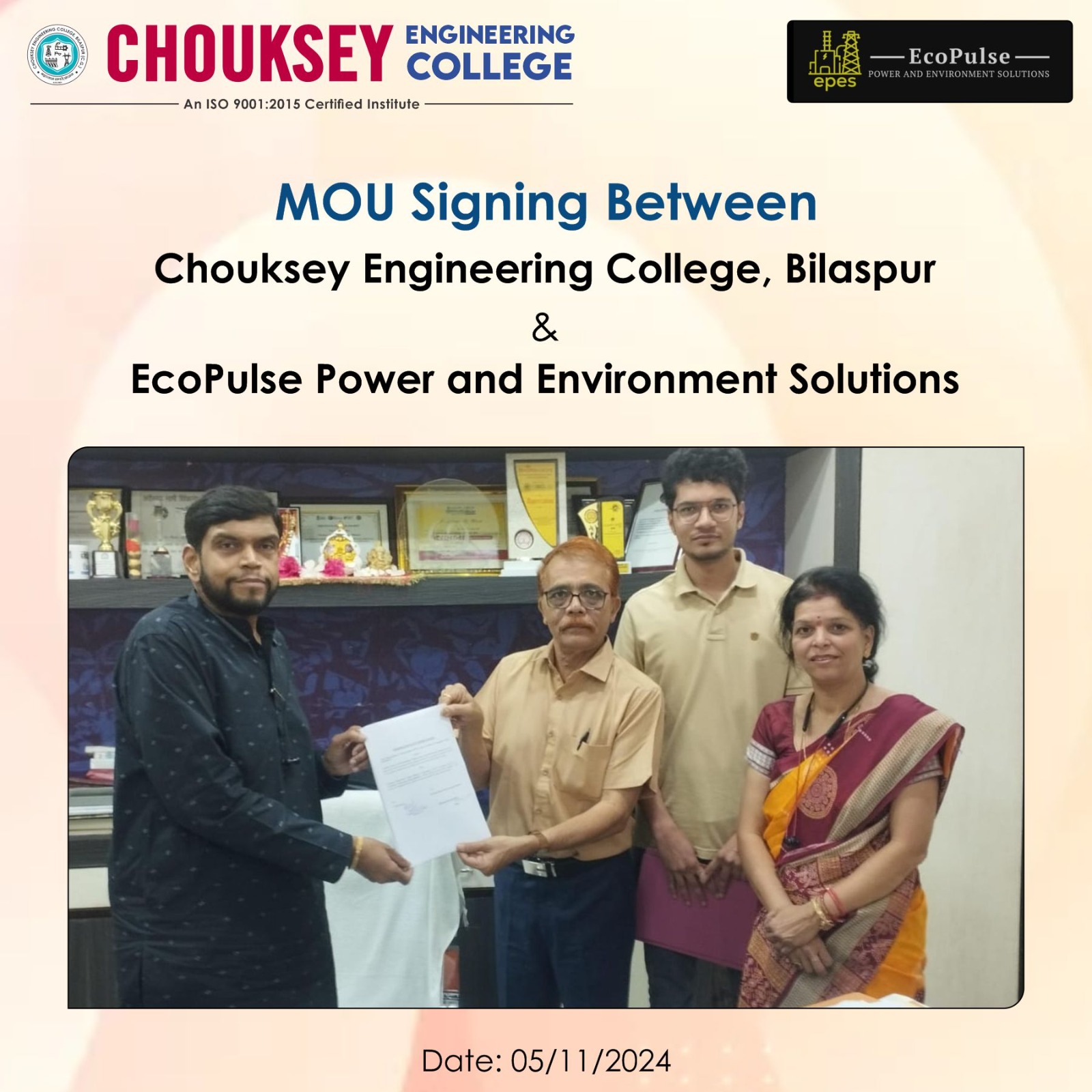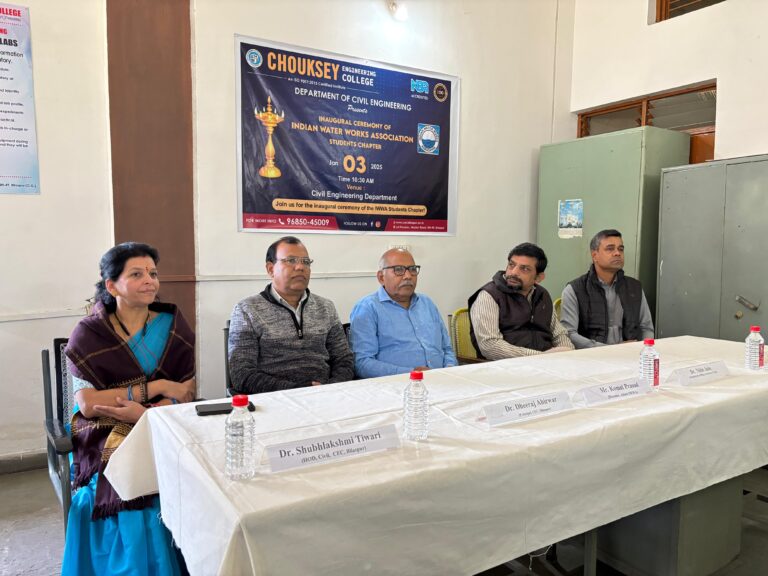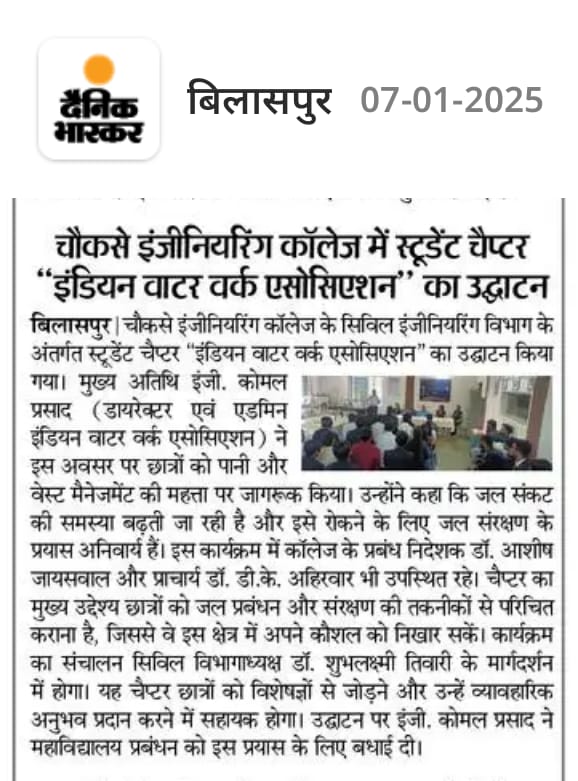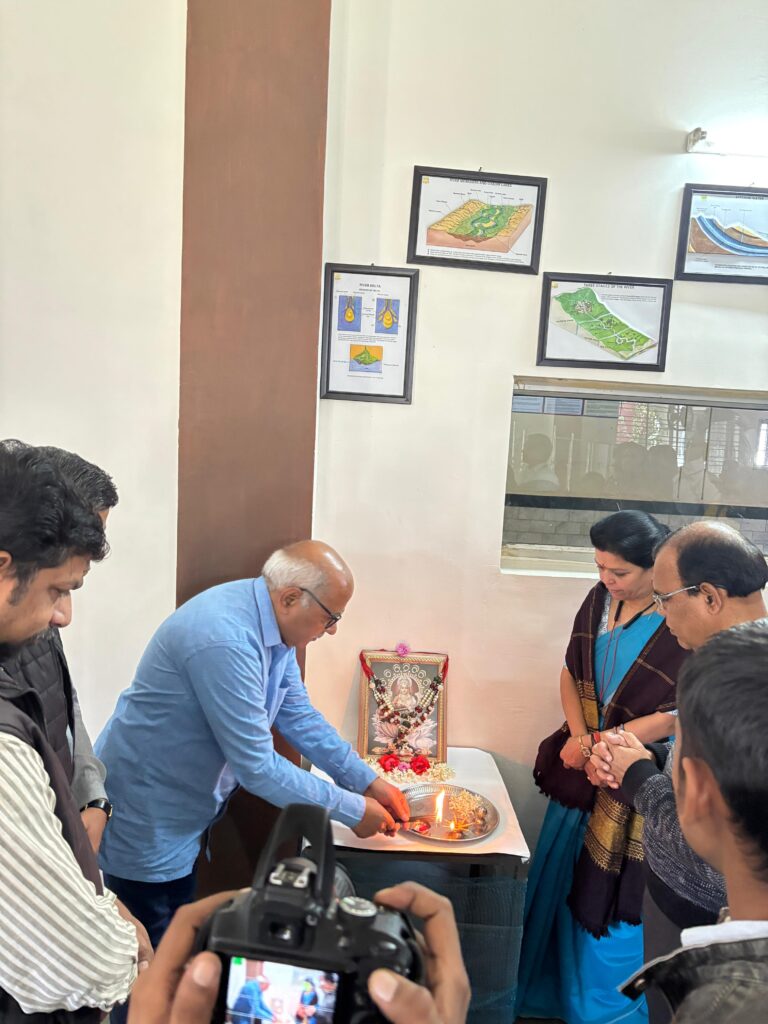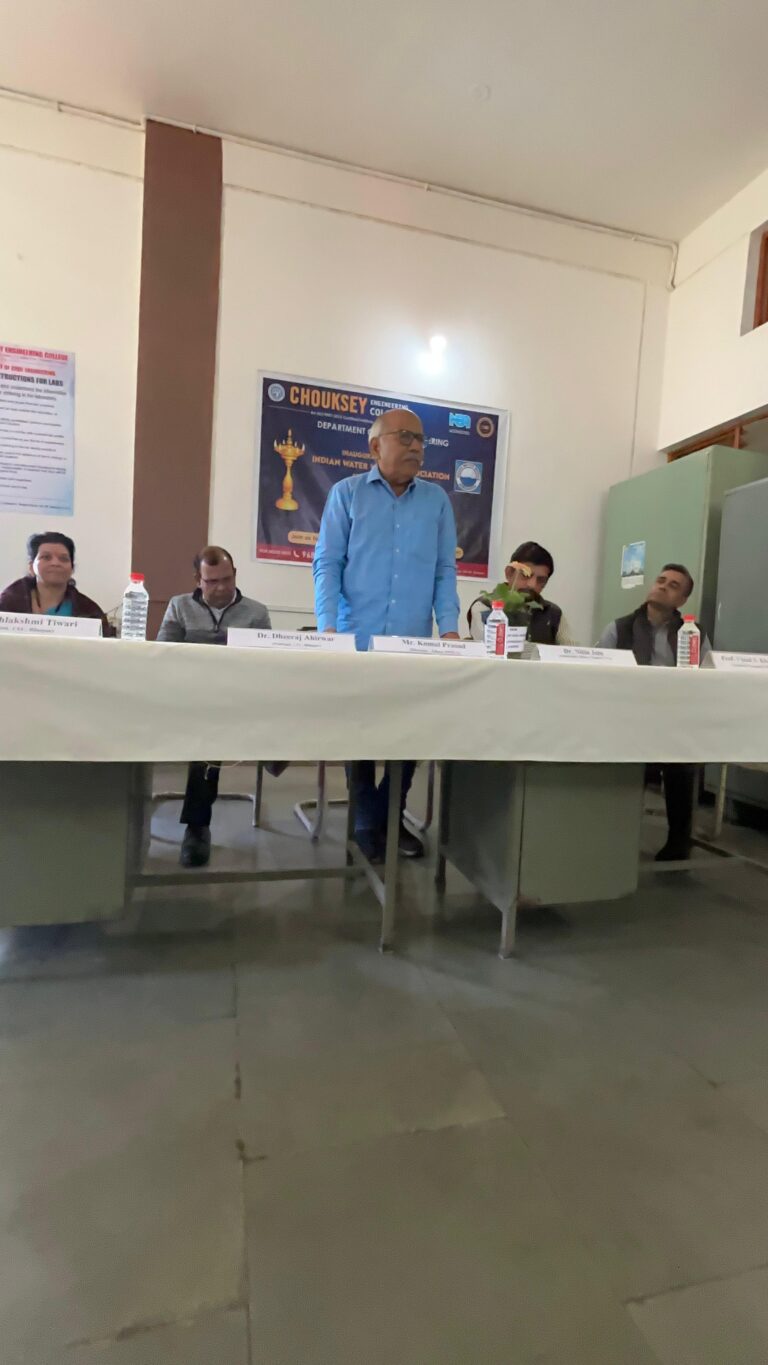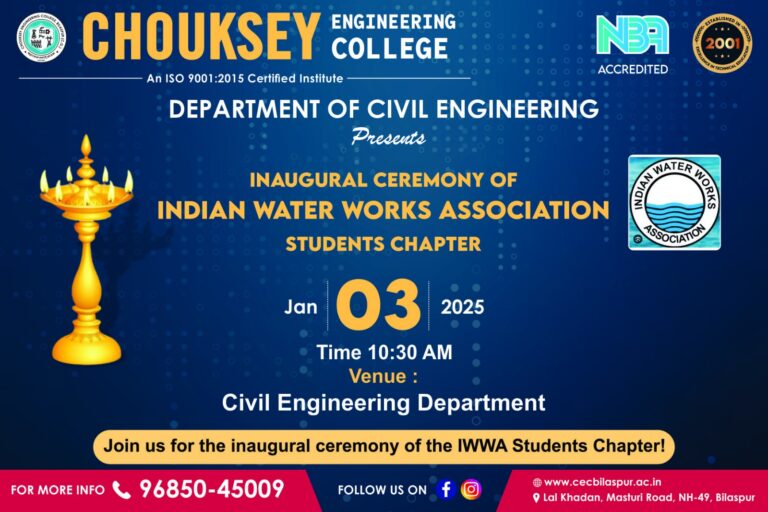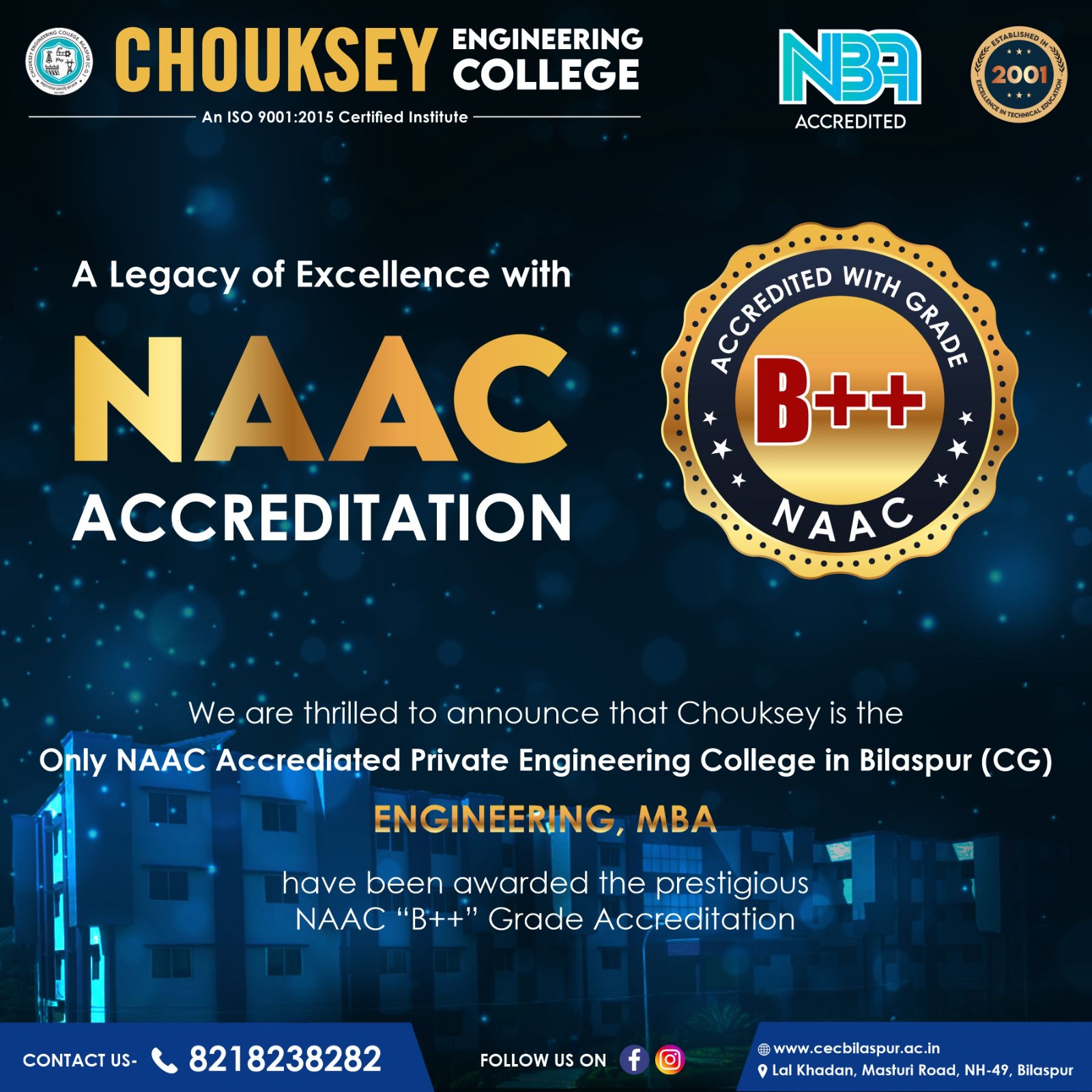Chouksey Engineering College introduced its B.Tech program in Civil Engineering in 2005, making it one of the college’s pioneering programs. Over the years, the program has experienced significant growth, establishing itself as a top choice for aspiring engineers in the region. It holds a prestigious position in the state, particularly recognized for its excellence in Civil Engineering and being the only NBA-accredited program in the region.
Our program boasts a diverse and dedicated faculty, committed to delivering high-quality education and fostering innovative research. We provide state-of-the-art facilities and a supportive environment conducive to the growth of both faculty and students. Our research activities encompass both fundamental and applied aspects, and we offer consultancy services, lending our technical expertise to various organizations through numerous R&D projects. Recently, our program has received substantial government funding, leading to groundbreaking research outcomes with practical real-world applications. Civil Engineering, a cornerstone of development, involves the application of scientific principles, mathematical theories, mechanical concepts, and cutting-edge computer technologies in the planning, analysis, design, and construction of diverse infrastructural projects.
MEMORANDUM OF UNDERSTANDING
Our Civil Engineering graduates have consistently secured placements in top-tier companies across various industries. With a focus on industry readiness, our placement cell works closely with students to help them build the necessary skills and secure rewarding career opportunities.
SNO. | Name | Designation | Date of joining institution |
1 | Dr. Shubhlakshmi Tiwari | Professor | 12.01.2012 |
2 | Dr. Vinay Simpi | Assistant Profess. | 01.09.2023 |
3 | Mr.Abhishek Singh | Assistant Profess. | 17.11.2020 |
4 | Mrs.RollyVaishnav | Assistant Profess. | 04.07.2017 |
5 | Mr.V. Somesh | Assistant Profess. | 02.03.2021 |
6 | Mr.SushilSankre | Assistant Profess. | 5/1/2023 |
7 | Mr.Gyan Prakash Sharma | Assistant Profess. | 14.07.2014 |
8 | Mr.Rahul Gupta | Assistant Profess. | 24.01.2024 |
9 | Mr.Shrey Pathak | Assistant Profess. | 01/08/2024 |
10 | Mr.Vikas Singh | Assistant Profess. | 02.12.2024 |
11 | Mrs.Anjali Gupta | Assistant Profess. | 19.07.2019 |
12 | Mrs.Rekha Yadav | Assistant Profess. | 01.08.2024 |
Creating adaptable learning environment
As per the swift Technical expansion and the new learning solutions are available and it enables more information and communications technology a focal point of learning environment for the students. Department of Civil Engineering is determined to provide an adaptable learning to the students.
Learning through manifold channels
We focus in the planning of versatile studying and working methods which revolves around the learner. The learning environment is built taking into account the needs of various learners, enabling the use of manifold channels in learning situations like Problem and project based learning Channel, Industrial interactive channel, on-hand training channel and so on.
Learning through visual and audio environment
The illustration atmosphere greatly influences the awareness of visual stimuli as well as the learning outcomes and learning attitudes of the students. Every method and approaches is practiced through the use of audio and visual learning pedagogy, which benefit the students in one or the other way.
Teaching through assessment and peer review
Assessment play vital role in analyzing the outcome of the teaching learning process. This is accomplished by regular class test, assignments and tutorials. A peer review is than presented to students for their presentation and projection.
Interactive methods and program level strategies
Interactive methods are adopted through which simulation model of various virtual prototype is developed, which play important step for enhancing the knowledge of students. Small group teaching is also practiced for bringing out the best. A program level strategy mainly focuses on the various emerging research and entrepreneurship areas of Civil Engineering in the undergraduate level.
Civil Engineering Department Achievements 2021-2022
- A Guest lecture on “Shear Strength of Soil” by Dr. Sandeep Chouksey, 12th March 2022.
- Women's Day celebration [The Wisdom Tree Foundation and Women Grievance Cell], 11th March 2022.
- A Webinar on “Career Perspective of Civil Engineering” by Vijesh Shinde, 17th January 2022.
- Nanhi Kali [Special Little Miracles], [National Girl Child Day], [The Wisdom Tree Foundation and Women Grievance Cell], 24th January 2022.
- A Webinar on Tunnel Engineering - “An Overview and Challenges”, 13th January 2022.
- A Webinar on “Beyond Brick and Mortar”, 27th November 2021.
- Online activities during lockdown and online classes, 5th August 2021.
- Recent Challenges in Teaching Pedagogy Phase-II, 23rd to 29th April 2021.
- Recent Challenges in Teaching Pedagogy Phase-I, 12th to 18th March 2021.
- GATE Qualifiers, 2022
| Topic Name | PDF Link |
|---|---|
| GATE Qualifiers 2024 | Click here |
| GATE Qualifiers 2023 | Click here |
| GATE Qualifiers 2022 | Click here |
| Result 2020-21 | Click here |
| Topper List 2019-20 | Click here |
| Topper List 2020-21 | Click here |
| Topper List 2021-22 | Click here |
| Topper List 2022-23 | Click here |
| STUDENT ACHIEVEMENTS 22-23 | Click here |
| STUDENT ACHIEVEMENTS 23-24 | Click here |
| Topic Name | PDF Link |
|---|---|
| NIRMAN Departmental Newsletter Jan-June 2023 | Click here |
| NIRMAN Departmental Newsletter Jan-June 2023 | Click here |
| NIRMAN Departmental Newsletter Jan-June 2022 | Click here |
| NIRMAN Departmental Newsletter Jan-June 2019 | Click here |
| Workshop, FDP, Industrial Visit and Other Activity 2021-2022 | Click here |
| Workshop, FDP, Industrial Visit and Other Activity 2022-2023 | Click here |
| Workshop, FDP, Industrial Visit and Other Activity 2023-2024 | Click here |
MOU Signed Between CEC Bilaspur and EcoPulse Power
| Course | Eligibility | Seats | Duration |
| B.Tech in Civil Engineering | 12th marks For Gen -45% (PCM) For category -40% (PCM) | 60 | 4 Years |
Vision of the department
To produce Civil Engineers of high caliber with high technical skills and ethical value to serve the Society and Nation.
Mission of the department
M1: To offer an education that transform students with latest curriculum and in understanding societal and industrial demands.
M2: To create highly qualified, technically competent, and morally ethical civil Engineers who will serve society.
M3: To promote soft skills and team spirit, among the students to emerge as leaders of their profession and society.
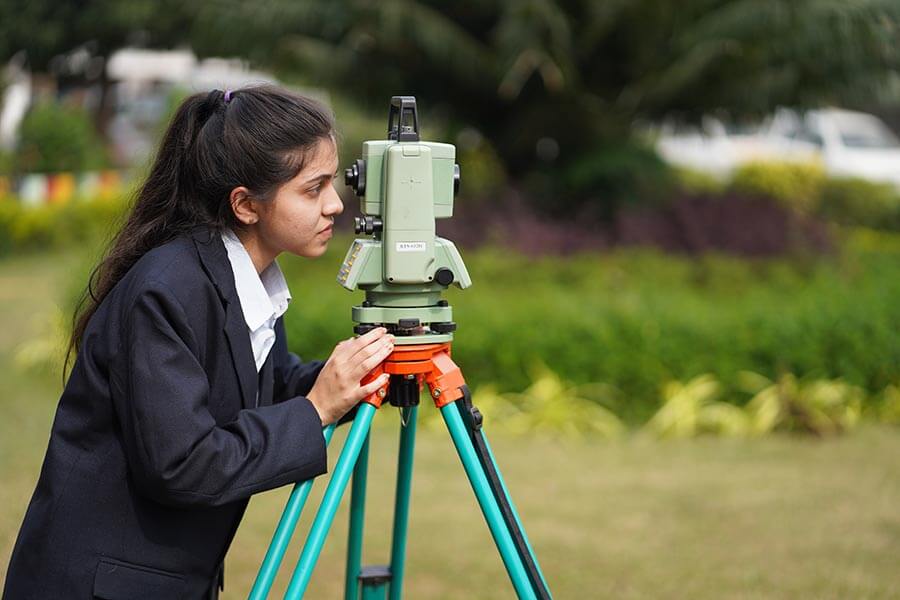
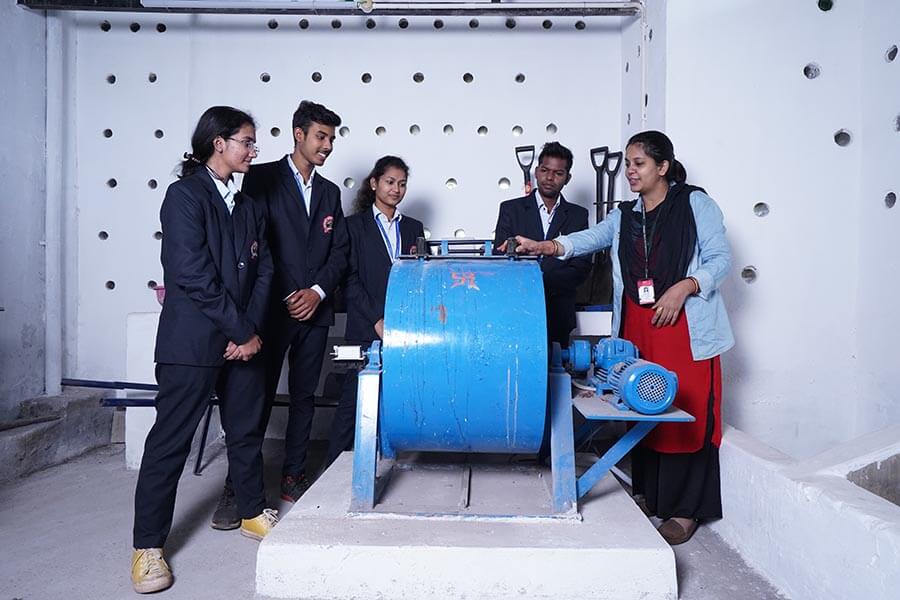
Program Educational Objectives (PEOs)
PEO 1: Graduate of the Programme will be professional Civil Engineers with global, ethical and societal responsibility.
PEO 2: Graduates of the Programme, as a researcher or as an Entrepreneur, will continue to learn to harness evolving technologies.
PEO3: Graduates of the Programme will acquire soft skills and leadership qualities to lead technical analytical procedures.
Program Specific Outcome (PSO)
PSO 1 :Proficiency in meeting the requirements of the public by designing and executing high-quality construction projects that take into account health, safety, cultural, societal, and environmental factors.
PSO 2:Competence in analyzing and designing structures, ranging from regular to complex, utilizing advanced building analysis software packages and incorporating the knowledge acquired during the program.
PSO 3:Ability to work effectively both individually and as part of a team, equipped with leadership skills and the capability to manage projects in multidisciplinary environments.
PROGRAM OUTCOMES (POs)
The Program Outcomes (POs) are statements that describe what students are expected to know and be able to do upon graduating from the program. These relate to the skills, knowledge, analytical ability, attitude, and behavior that students acquire throughout the program. The POs define the professional profile of an engineering graduate and indicate what students can do based on subject-wise knowledge gained during their studies. The following are the twelve POs defined by NBA, in line with the Graduate Attributes as outlined by the Washington Accord:
- Engineering Knowledge: Apply the knowledge of mathematics, science, engineering fundamentals, and an engineering specialization to the solution of complex engineering problems.
- Problem Analysis: Identify, formulate, review research literature, and analyze complex engineering problems, reaching substantiated conclusions using first principles of mathematics, natural sciences, and engineering sciences.
- Design/Development of Solutions: Design solutions for complex engineering problems and design system components or processes that meet the specified needs, with appropriate consideration for public health and safety, and cultural, societal, and environmental considerations.
- Conduct Investigations of Complex Problems: Use research-based knowledge and research methods, including the design of experiments, analysis and interpretation of data, and synthesis of information to provide valid conclusions for complex problems that:
- Cannot be solved by straightforward application of knowledge, theories, and techniques applicable to the engineering discipline (as opposed to textbook problems solvable using basic engineering theories).
- May not have a unique solution (e.g., design problems that may have multiple possible solutions).
- Require consideration of appropriate constraints/requirements not explicitly given in the problem statement (e.g., cost, power requirements, durability, product life).
- Need to be defined (modeled) within an appropriate mathematical framework.
- Often require the use of modern computational concepts and tools (e.g., in the design of an antenna or a DSP filter).
- Modern Tool Usage: Create, select, and apply appropriate techniques, resources, and modern engineering and IT tools, including prediction and modeling, to complex engineering activities, with an understanding of their limitations.
- The Engineer and Society: Apply reasoning informed by contextual knowledge to assess societal, health, safety, legal, and cultural issues, and the consequent responsibilities relevant to professional engineering practice.
- Environment and Sustainability: Understand the impact of professional engineering solutions in societal and environmental contexts, and demonstrate knowledge of, and the need for, sustainable development.
- Ethics: Apply ethical principles and commit to professional ethics, responsibilities, and norms of the engineering practice.
- Individual and Team Work: Function effectively as an individual, and as a member or leader in diverse teams, and in multidisciplinary settings.
- Communication: Communicate effectively on complex engineering activities with the engineering community and with society at large, such as being able to comprehend and write effective reports and design documentation, make effective presentations, and give and receive clear instructions.
- Project Management and Finance: Demonstrate knowledge and understanding of engineering and management principles, and apply these to one’s own work, as a member and leader in a team, to manage projects in multidisciplinary environments.
- Life-long Learning: Recognize the need for, and have the preparation and ability to engage in independent and lifelong learning in the broadest context of technological change.
